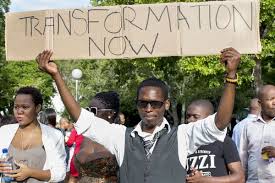
Masixole Booi, Louise Vincent and Sabrina Liccardo
Two manuscripts1-2 are currently being developed from Masixole Booi’s MA thesis3 which examines whether the Accelerated Development Programme (ADP) for black academics can be thought to have contributed to the interruption or reproduction of the existing dominant institutional culture of the university. The post-apartheid higher education transformation project is faced with the challenge of recruiting and retaining black academics and other senior staff, particularly at Historically White Universities (HWUs). Several South African universities have responded to this challenge by initiating programmes for the ‘accelerated development’ of black academic staff. While these programmes do make a contribution to changing the demographic composition of the academic workforce, we suggest that what is also needed is a radical change of institutional cultures and practices that are currently informed by racialised, gendered and classed assumptions inherited from the colonial and apartheid past.
Employing Pierre Bourdieu’s theoretical framework of social and cultural reproduction, we consider the wider implications of such programmes for transforming/reproducing existing institutional cultures. The manuscripts draw on interviews with 18 black lecturers who entered the academic workforce through the university’s ADP. We were interested to examine how the participants were or were not able to resist and challenge the dominant cultural practices of the university and how the programme can be thought to have contributed to the interruption or reproduction of the hegemonic institutional culture at the study site: Rhodes University. Our findings indicate that academic inbreeding and the tendency to want to recruit the ‘right’ kind of black academic who is most likely to embody, adopt and adapt to, existing ways of doing things lead to ADPs changing institutional demographics but not institutional cultures. Our findings further indicate that black academics often feel excluded, rejected and invisible when they attempt to interrupt the fundamental features of dominant raced, classed and gendered institutional practices and cultures.
It is the intention of ADPs to recruit black academics who can contribute to the development of new, shared cultures and values in institutions currently experienced as alienating by many people. However, while these programmes do make a contribution to changing the demographic composition of the academic workforce, we suggest that when an institution, whether wittingly or unwittingly, populates such a programme with its own ‘timber’ or with those who are perceived to ‘fit in’, the reproduction of precisely those white-middle-class dispositions that perpetuate alienation, marginalization and exclusion is assured.
Notes
1. Booi, Vincent & Liccardo (2016). ‘If it ain’t broke, don’t fix it’: Challenges facing institutional transformation of historically white South African universities. Unpublished manuscript.
2. Booi, Vincent & Liccardo (2016). Counting on demographic equity to transform institutional cultures at historically white South African universities? Unpublished manuscript.
3. Booi (2015).Accelerated development programmes for Black academics: Interrupting or reproducing dominance? (Unpublished master’s thesis). Rhodes University, Grahamstown.
